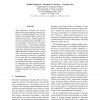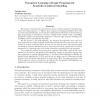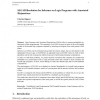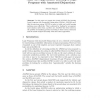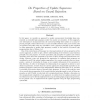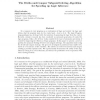133
click to vote
ACL
2012
13 years 4 months ago
2012
Most information extraction (IE) systems identify facts that are explicitly stated in text. However, in natural language, some facts are implicit, and identifying them requires â€...
154
click to vote
CORR
2011
Springer
14 years 5 months ago
2011
Springer
We propose a logical/mathematical framework for statistical parameter learning of parameterized logic programs, i.e. de
nite clause programs containing probabilistic facts with a ...
152
click to vote
SUM
2010
Springer
15 years 11 days ago
2010
Springer
Abstract. Action-probabilistic logic programs (ap-programs), a class of probabilistic logic programs, have been applied during the last few years for modeling behaviors of entities...
130
click to vote
FUIN
2010
15 years 17 days ago
2010
Abstract. Logic Programs with Annotated Disjunctions (LPADs) allow to express probabilistic information in logic programming. The semantics of an LPAD is given in terms of the well...
144
click to vote
ML
2008
ACM
15 years 1 months ago
2008
ACM
In this paper we present the system ALLPAD for learning Logic Programs with Annotated Disjunctions (LPADs). ALLPAD modifies the previous system LLPAD in order to tackle real world ...
137
click to vote
TPLP
2002
15 years 1 months ago
2002
In this paper, we consider an approach to update nonmonotonic knowledge bases represented as extended logic programs under the answer set semantics. In this approach, new informat...
137
click to vote
TPLP
2002
15 years 1 months ago
2002
We study the properties of input-consuming derivations of moded logic programs. Inputconsuming derivations can be used to model the behavior of logic programs using dynamic schedu...
125
click to vote
JAIR
1998
15 years 1 months ago
1998
It is common to view programs as a combination of logic and control: the logic part de nes what the program must do, the control part how to do it. The Logic Programming paradigm ...
105
Voted
JFLP
2002
15 years 1 months ago
2002
We consider prescriptive type systems for logic programs (as in G
129
click to vote
ENTCS
2002
15 years 1 months ago
2002
Dynamic Logic Programming (DLP) was introduced to deal with knowledge about changing worlds, by assigning semantics to sequences of generalized logic programs, each of which repres...
